SHEDS WA











https://mensshedswa.org.au/
To discuss stories contribution please contact the team at admin@mensshedswa.org.au
Credit to Gordon MacGilp for producing the magazine
Cover: Artwork by Jason Dimer
Page 6-7: Olabud Doogethu
Page 8: Subiaco Men’s Shed
Page 10-11: Rhiannon Arnold
Page 12: Rhiannon Arnold
Page 13: Artwork by Jason Dimer
Page 14-15: Rory Grenfell
Page 16-17: ABC Great Southern
Page 18-19: South West Aboriginal Medical Service
Page 20-21: Stock image
Page 21: Vincent Men’s Shed
Page 22: MAN Health Clinic
If you would like to comment on any aspect of this newsletter, please contact us on: (08) 6381 5324 or e-mail: admin@mensshedswa.org.au www.mensshedswa.org.au facebook.com/mensshedswa
All rights reserved. No part of this publication may be reproduced, stored in a retrieval system, or transmitted, in any form or by any means, electronic, mechanical, photocopying, recording or otherwise without the prior written permission of the Publisher and copyright owners.
The contents of this publication are believed correct at the time of printing.
Nevertheless the Publisher can accept no responsibility for errors or omissions, changes in the detail given or for any expense or loss thereby caused.
Men’s Sheds of WA does not warrant that any website mentioned in this title will be provided uninterrupted, that any website will be error free, that defects will be corrected, or that the website or the server that makes it available are free of viruses or bugs. For full terms and conditions please refer to the site terms provided on the website
Kaya!
Men’s sheds in Australia recently celebrated their 30th anniversary, a magnificent milestone in fostering community and wellbeing among men. The team were reflecting on this at our State Conference late last year. We were reminded at the Conference that the origins of men’s gatherings in Australia extends far beyond our modern movement and is a concept that is rooted in Aboriginal culture and traditions. This was evident in the warm Welcome to Country from Dr Richard Walley OAM and in the Conference painting shared with us by Gary Pontifex of the Motorcycle Men’s Shed. The painting, the cover of this edition of Sheds WA, is by talented Aboriginal artist Jason Dimer. His painting depicts sharing stories around the camp and represents both the longstanding Aboriginal traditions and mirrors the modern Men’s Shed.
Both the painting and the Welcome were a great reminder that the success of Men’s Sheds is a long standing formula. Such gatherings have been pivotal to the social and ceremonial life of Aboriginal communities for thousands of years. They
have served as crucial spaces for men to engage in rites of passage, share cultural knowledge, and uphold traditional laws.
We are excited to see the Men’s Shed movement grow and embrace diversity and WA’s Aboriginal heritage. We clearly have a lot to benefit from and to learn from; both forms of gatherings highlight the importance of communal support, whether through long-standing tradition or contemporary practices.
Sheds are also increasingly becoming places for younger men as well as old; however it is clear that Sheds ‘elders’ play a central role in positive mentoring, guiding conversations and imparting their knowledge.
Both traditional gatherings and modern Men’s Sheds demonstrate a timeless human need for sharing stories, fostering connection and wellbeing. With this in mind I hope that you enjoy this edition of Sheds WA.
James Wild CEO, Men’s Sheds of WA
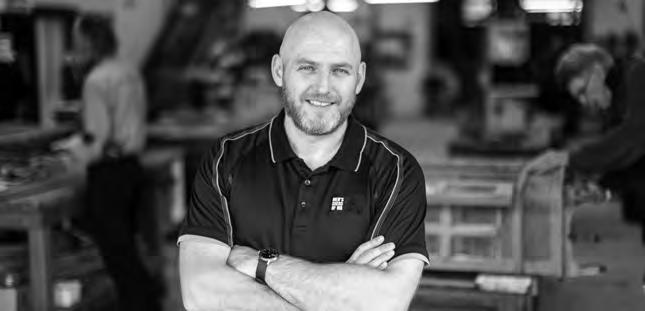
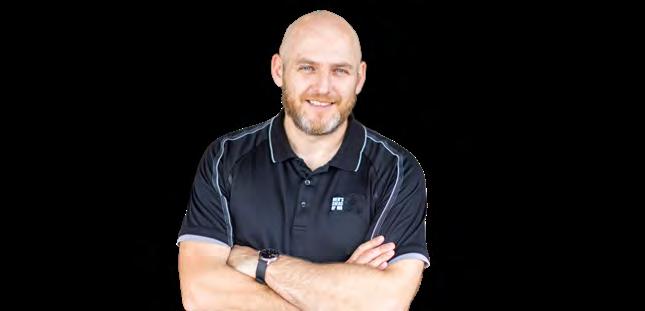


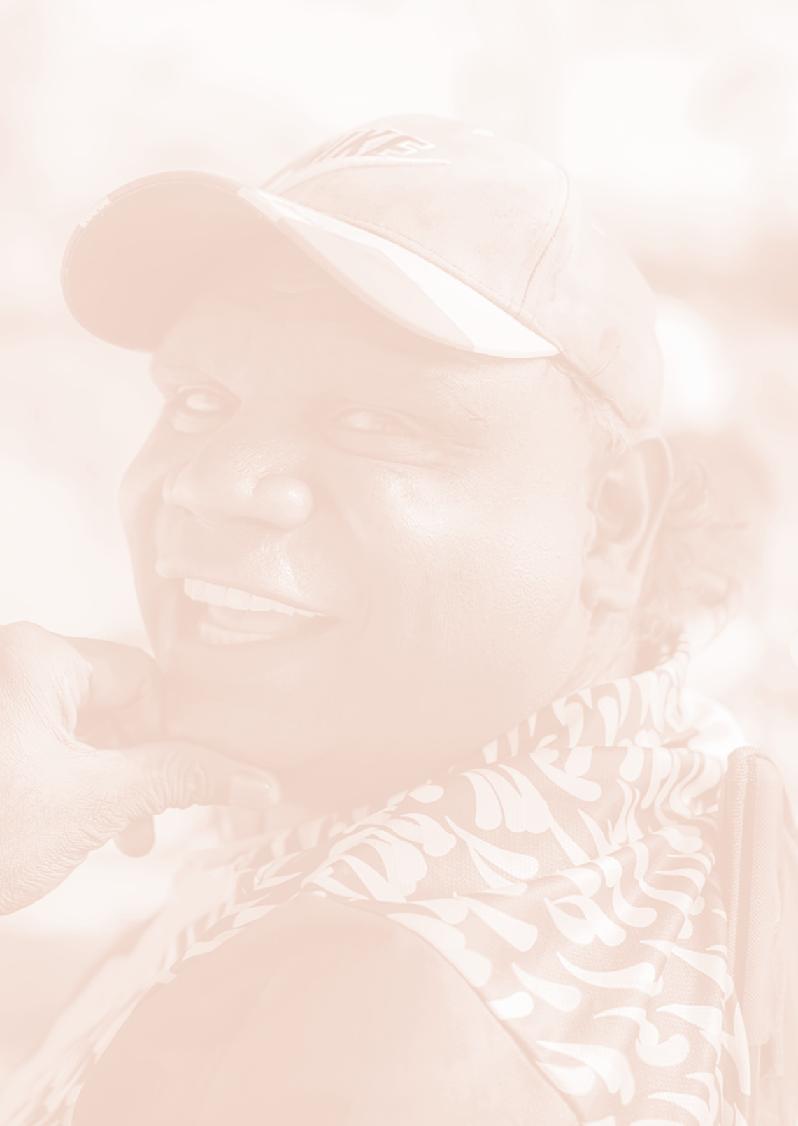
By Rhiannon Arnold
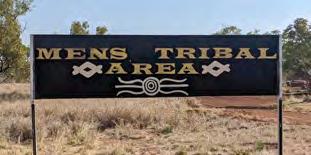
In the east Kimberley town of Halls Creek, a unique Men’s Shed is creating an essential space for community and culture.
The Men’s Tribal Centre, located on the former Hall’s Creek golf course, has been established on a traditional Aboriginal ceremonial ground and aims to be a culturally safe space for Aboriginal men to come together.
With four different tribes in the area, Jaru, Kija, Walmajarri and Banuba, the Elder’s Reference Group worked together with Olabud Doogethu Aboriginal Corporation and the Shire of Halls Creek to create this culturally significant initiative.
One thing that sets this particular Men’s Shed apart from many others across WA is its inclusion of younger people. Members
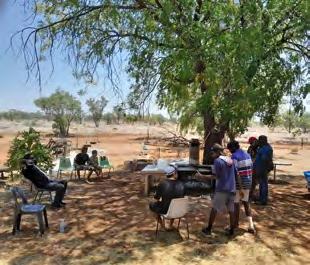
as young as 12 are not just welcome, but encouraged to attend, and it was the young male population of Halls Creek that helped to inspire the creation of the Men’s Tribal Centre.
Olabud Doogethu Human Rights Officer, Larry Smith said creating the Men’s Tribal Centre was important to the Elders so they could support the young people in their community. Halls Creek has a large youth population with 43.2% under the age of 25, and 9.5% of the Halls Creek population between 15 and 19 years of age, according to the 2021 Australian Bureau of Statistics census.
“[The Elders] really wanted something to get these boys back into some sort of [cultural] involvement,” Larry said.
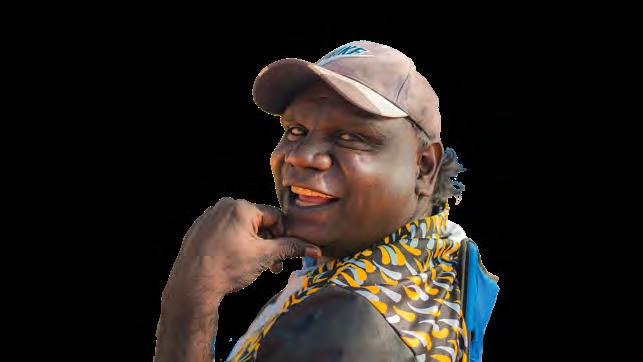
Olabud Doogethu
Director, Dean Mosquito
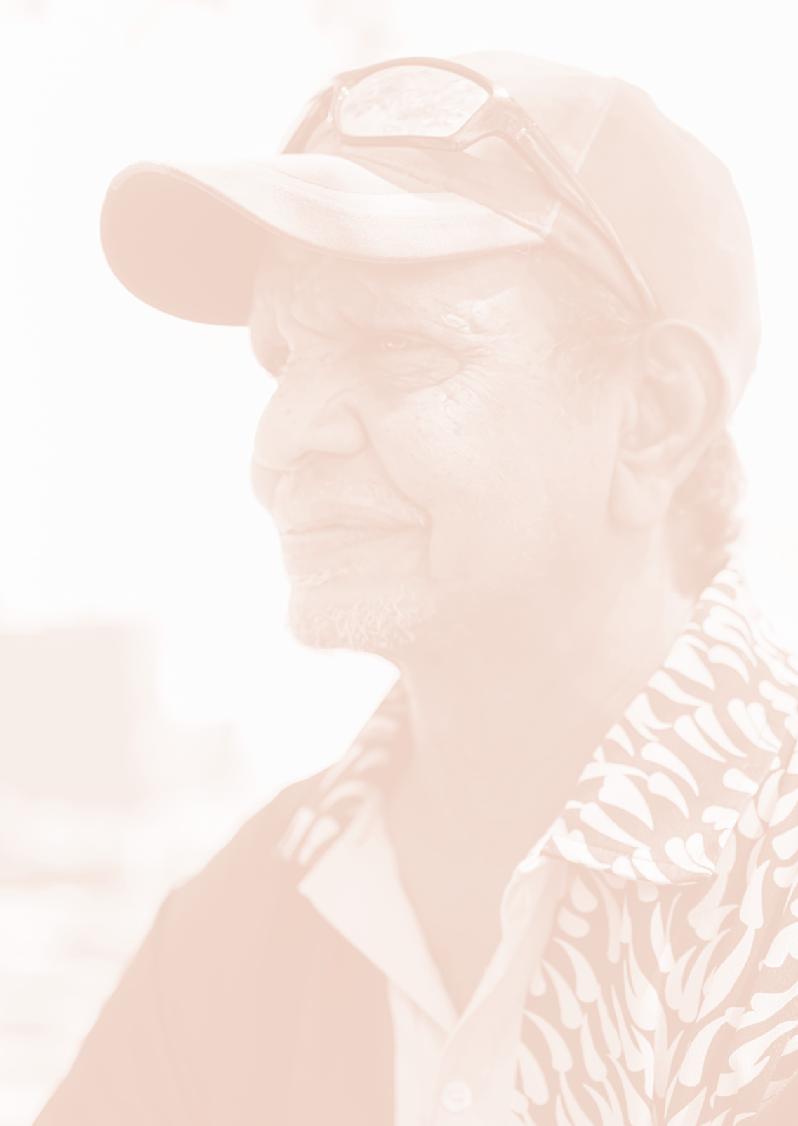
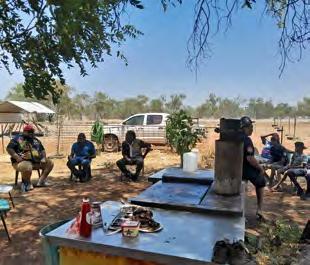
“They’re very concerned that both language and culture is being lost among this generation … there’s not another generation of emerging Elders being built up.
“That’s why they wanted their own space to do Cultural things with these boys that weren’t happening in any other organised way.”
The Shed is very much integrated with the outdoors and includes activities such as hunting and traditional cooking practices.
But just like any Shed, the members also love to sit around with a cuppa and share stories.
“The men who attend say, they really like having somewhere to go, because there’s
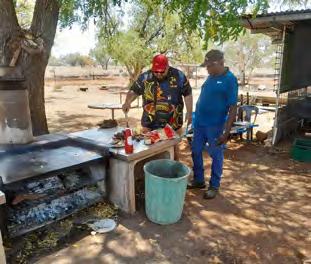
nowhere else for them to go as men, apart from the pub,” Larry said.
Like many Sheds, the Men’s Tribal Centre has a focus on providing a supportive and accepting environment for its members, and while the Shed is strictly Men only, it is open for non-Aboriginal people to connect with the Aboriginal cultures from around the area.
When the Shed was being established, the Elders liaised with stakeholders around Halls Creek, including the local hospital and NDIS providers, to involve as many people in the project as possible.
If you’re interested in learning more about the Hall’s Creek Men’s Tribal Centre contact Olabud Doogethu.
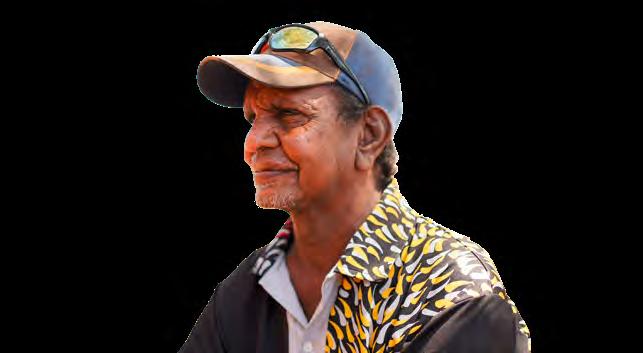
Olabud Doogethu Human Rights Officer, Larry Smith
By James Wild CEO of Men’s Sheds of WA
Curtin University and Men’s Sheds of WA have been working on a research project since 2021 to identify ‘What Makes a Thriving Shed’.
One of the key outcomes of this research, the ‘Thriving Shed Model’ identifies eight key factors that, when delivered well, should help to ensure the long term viability and vitality of a Shed. In upcoming editions of Sheds WA we will explore each of the eight factors. In this edition, we focus on Stronger Partnerships.
Professor Peter McEvoy of Curtin University noted ‘through our research we could clearly see that strong relationships with other community organisations and local councils is critical. Strong partnerships mean that you have a wider network to call on for support. This is most notable with local councils. Council relationships are critical for very practical reasons;
they may lease the building to the Shed, manage planning processes, or offer grants for capital works and equipment. Councils can also help through community development support, offering guidance to Shed leaders and helping to broaden their local networks’.
The Subiaco Community Men’s Shed exemplifies how Men’s Sheds can thrive through building such relationships. The Shed has long been a haven for older men who experience loneliness and mental health issues. It also offers an inclusive space for younger men and those with
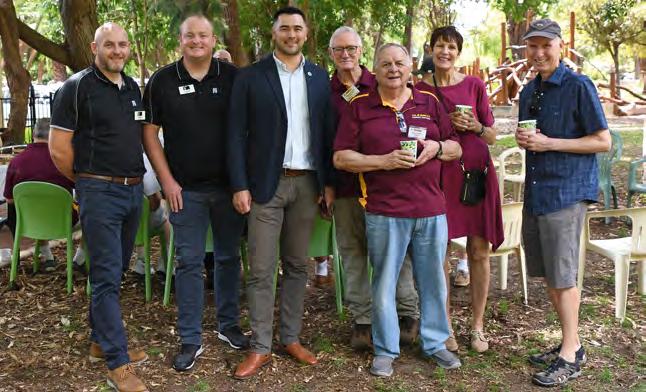
disabilities or health conditions, including autism, cancer, and dementia. It provides a supportive environment where members can work on personal or community projects, share skills, and connect with peers.
Shed President Gary Gaunt says; ‘we pride ourselves on working with other community organisations and with the City of Subiaco. We are mindful that to get the best outcomes for our members, for the Shed and for the community we need to invest time in fostering key relationships. We have taken this one step further than most Sheds and now have a formal partnership agreement with the City’.
The City of Subiaco has long supported the Men’s Shed with various upgrades, including building extensions, new signage, and carpark resurfacing. These investments have significantly contributed to the Shed’s ability to serve its members effectively. However, the recent partnership is a sign of ongoing support and recognising the value of a Shed in the community. As Gary highlights ‘with the partnership comes
funds that enable the Shed to foster better mental health outcomes for more men in our area. This includes hosting open days to attract new members, offering first aid and CPR training, creating a new website and social media presence, and installing security and safety equipment’.
At our Men’s Sheds of WA State Conference, we brought together a panel of local government experts, including Mayor David McMullen from the City of Subiaco. The panel took questions from Shed leaders across WA and reiterated that such examples of partnership working, as takes place in Subiaco, serve as compelling examples of how good local collaboration can enhance the effectiveness, longevity and reach of Men’s Sheds. The Subiaco partnership illustrates a model that other Men’s Sheds can adopt. Forging strong collaborations with local partners is not just about securing crucial funding and resources for operations, but also extends community reach and helps Sheds to address specific community needs from the ground up.

By Rhiannon Arnold
In just over a year since its establishment in March 2023, the Motorcycle Men’s Shed has carved an impressive path across Western Australia, visiting their 50th Men’s Shed, the Lake Monger Community Shed, on 25 June 2024. The Motorcycle Men’s Shed has grown into a thriving organisation boasting 101 members and a robust online presence with 2.5K followers on Facebook.
President Gary Pontifex reflected on the unique Sheds journey, emphasising the role of their dedicated members in the Shed’s rapid growth.
“We can’t do it without our members and we’re getting lots of membership support and it’s making us all stronger,” he said. This support has been crucial in enabling the Shed to expand its outreach and impact.
Central to the Motorcycle Men’s Shed’s mission is the promotion of mental health awareness. Whenever they visit a shed, even if only for the morning tea break, they use the opportunity to raise awareness with the other Shedders they meet.
“We talk to them about raising awareness of mental health issues. We can’t solve anything because we’re not clinicians or doctors but if they wanted some kind of pointing in a direction, several of us have done a mental health first aid course,” Gary said.
Many Sheds have a volunteer Wellbeing and Health Officer (WHO). Graham, the Motorcycle Men’s Shed WHO has developed a template for the Motorcycle Men’s Shed members to use when speaking to other Shedders.
“We don’t really get the shedders for much longer than 10 minutes of their tea break so we’ve come up with a 10 minute thing that highlights some of the questions you might ask, some of the actions you might take if you’ve noticed someone hasn’t been around for a while, or you’re not sure how to ask someone about how they’re feeling.
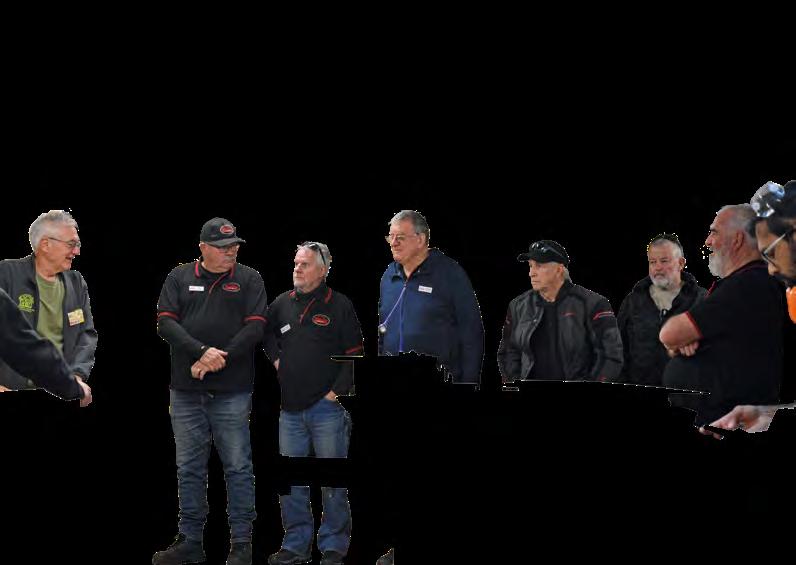
“It’s quick but it gives [members] some sort of insight, and if they want to know more we can always steer them in the right direction to go and talk to someone else and [get more formal training],” Gary said.
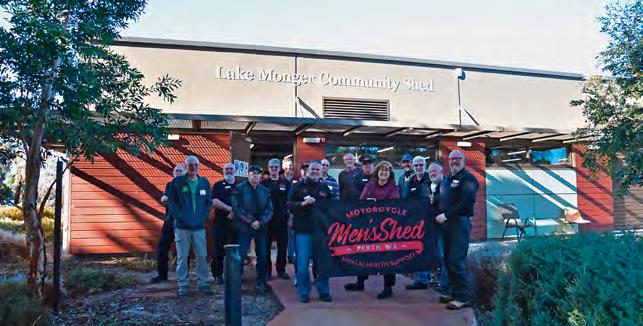
Navigating vast distances across Western Australia hasn’t deterred the Shed members from their mission.
“We’ve probably done about 25 sheds this year. It’s a lot of kilometres. In 13 or 14 months I’ve done about 50,000km’s,” Gary said.
Looking ahead, the Motorcycle Men’s Shed is poised for even greater endeavours. Gary has plans for an Australia-wide tour next year, aiming to extend their reach and impact beyond Western Australia.
“It was one of those things that I had a particular interest in; fostering an awareness of mental health.
“I wanted to do my bit in trying to help people who didn’t know where to turn in the mental health system. I looked for an organisation I could work with, and that’s when I started talking to Men’s Sheds of WA,” he said.
With each shed they visit and each conversation they initiate, they reinforce the vital importance of mental health awareness and support within Australia’s Men’s Shed movement.
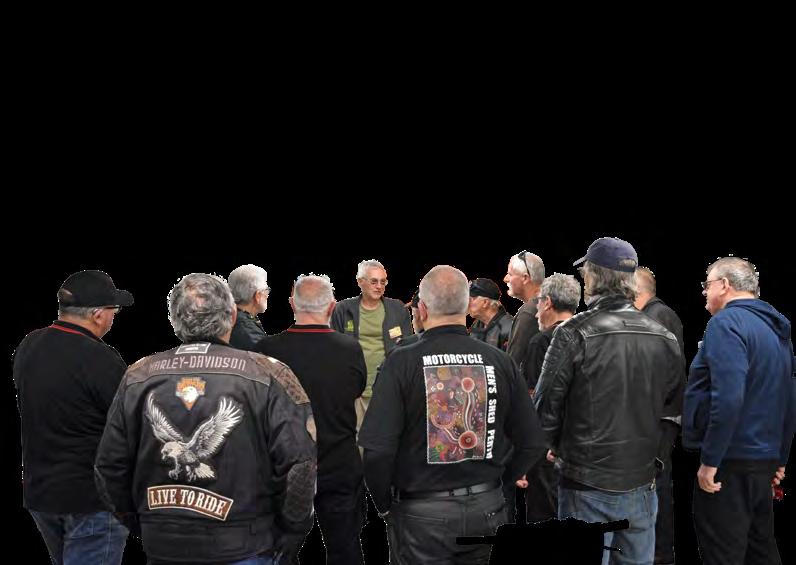
By Rhiannon Arnold
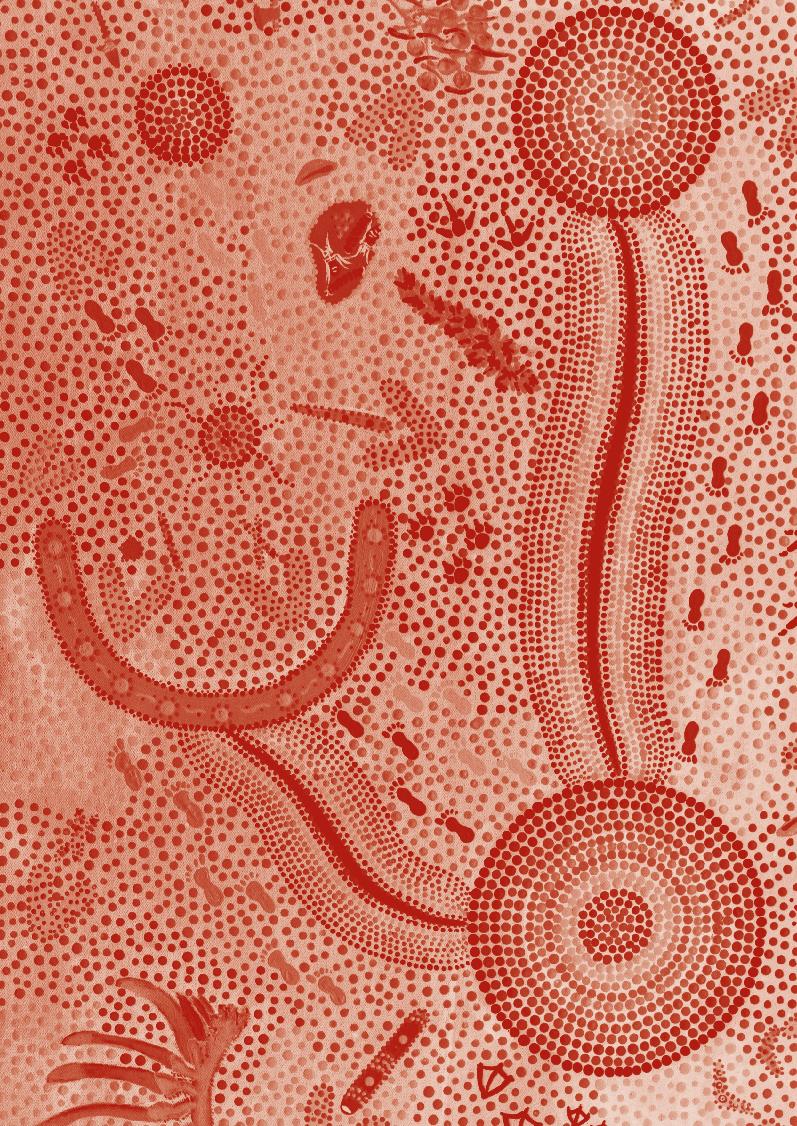
If you attended the Men’s Sheds of WA 2023 State Conference you may have seen a beautiful painting on display. That artwork now adorns the Motorcycle Men’s Shed’s shirts, and was provided by Indigenous artist Jason Dimer, a Wongutha, Ngadju, and Mirning man from Kalgoorlie.
The painting, commissioned by Motorcycle Men’s Shed President, Gary Pontifex, embodies the spirit of the Men’s Shed movement, and serves as a symbol of the importance of community connection.
Gary’s initial connection with Jason began before Gary started the Motorcycle Men’s Shed when Jason created a painting for a ride called the Goldfields Muster.
“I rang an art gallery in Kalgoorlie and said I wanted to be put in touch with someone who could maybe do a painting for me, and they pointed me in his direction. He does a lot of murals in Kalgoorlie,” Gary said.
“He did a really good job - I loved it - so I rang him and told him I’d started with Men’s Shed and asked if he would be interested in doing a painting for me that depicts from an Indigenous point of view, the Men’s Shed and what it means.”
The painting has fostered a strong sense of unity among Shed members.
This is the story of the journey of man.
The man can be seen sitting with his family. He is going about his daily duties as a father and a provider.
Although the man is with his family, in his mind at times he is alone.
At the larger waterhole the man meets up with some friends. They share stories, sing songs and they tell of a camp where there are many men who have many things in common with him.
He walks to the camp with his friends.
“Nearly everyone has their T-Shirt on, or a hat and the pins. I thought there was room to make a real movement of the Men’s Sheds,” Gary said. This initiative has encouraged members to proudly wear their shirts and participate actively in the community.
Jason Dimer’s collaboration with the Motorcycle Men’s Shed exemplifies the possibilities that arise when communities come together to support one another. It sends a powerful message: if a shed wants to embark on a project but lacks specific skills, there’s nothing stopping them from reaching out and forming meaningful partnerships.
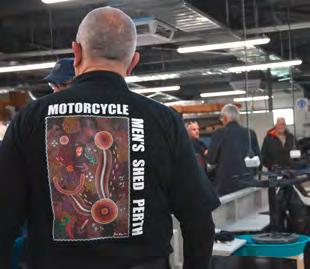
Around the fire and waterhole, the other men welcome him to join them. The fire represents warmth and comfort throughout the camp. They are creating tools and instruments, sharing food and water and medicine bush for health.
The men sing songs, tell stories and comfort one another emotionally and spiritually.
The man is now at peace with his concerns and returns home to his family refreshed and replenished.
The camp represents the Men’s Shed.
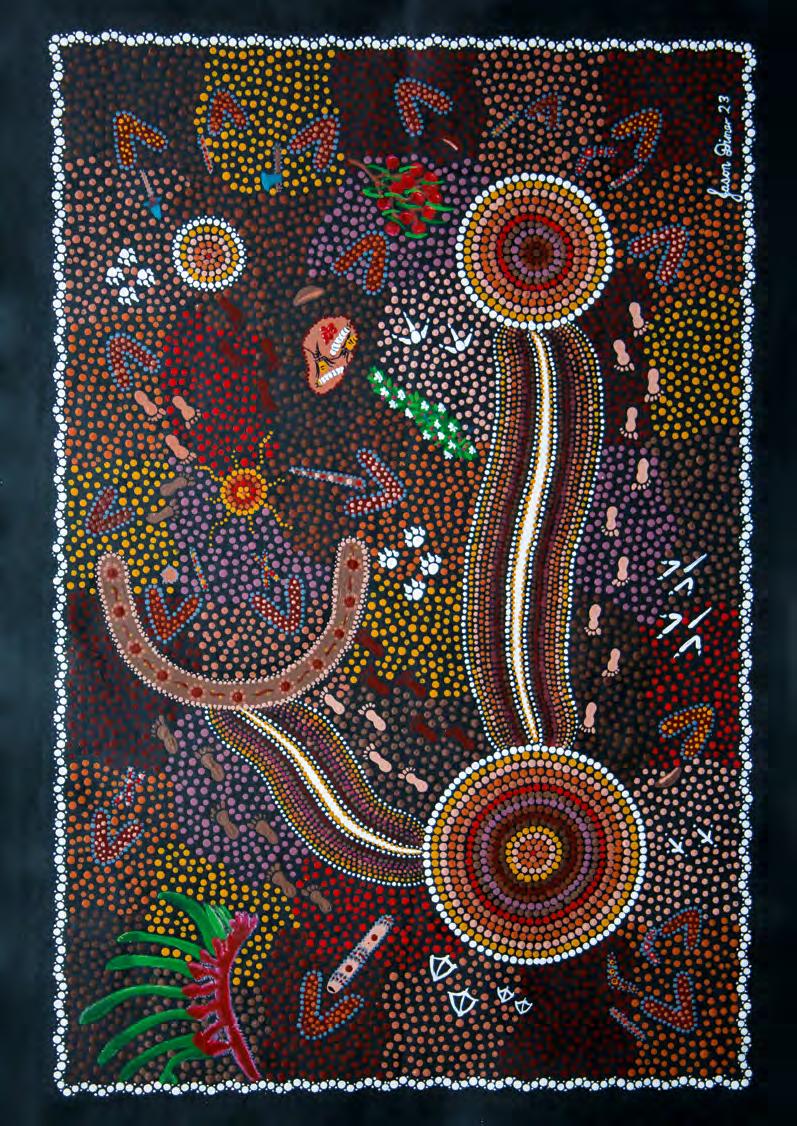
By Chloe Henville
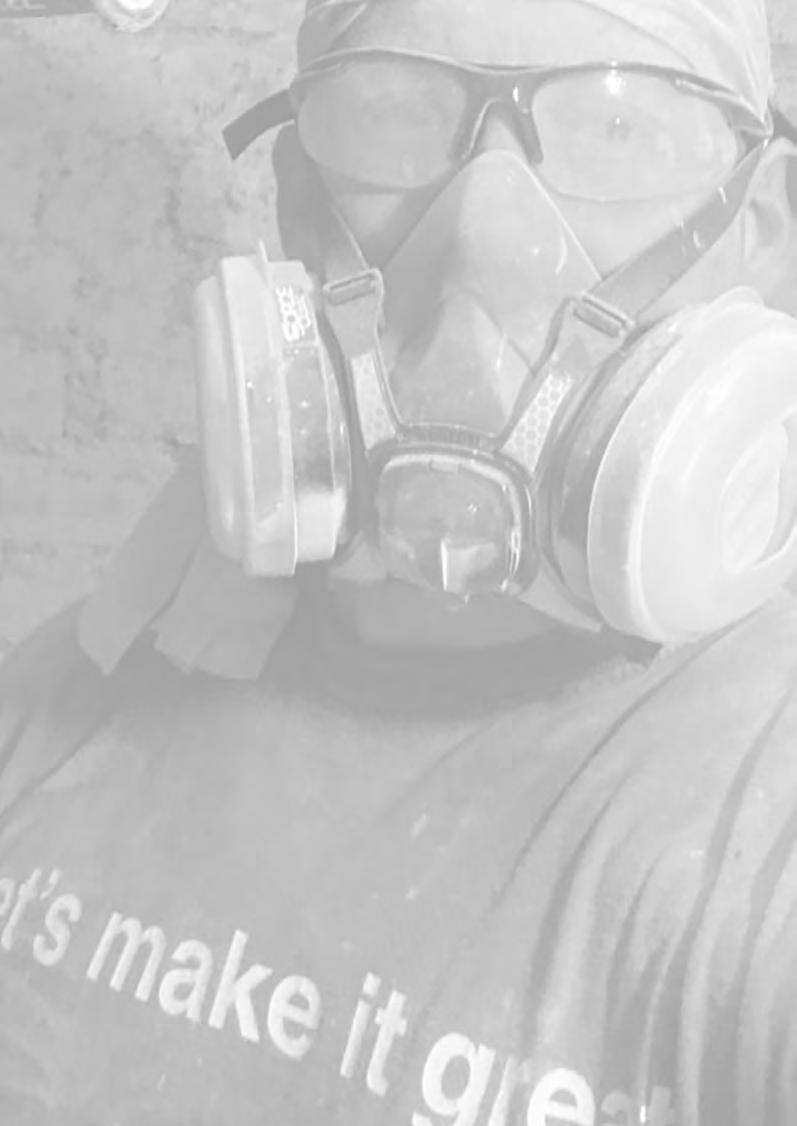
When you think of Men’s Shed members, a picture of retirees with a bit of extra time on their hands may come to mind. That’s who they’re for, you may be thinking. But forty-two-year-old ex-military turned management consultant, Rory Grenfell Bailey is breaking that mould – and encouraging others to do the same.
An active man, Rory keeps physically fit by running, cycling, swimming, Pilates and rowing. Yet he makes time for Men’s Shed, recognising its’ unique mental health benefits.
“One of the things that I knew that I needed for my own mental health was basically this opportunity to be able to go and be creative,” he says.
For Rory, that’s where the Mosman Park Men’s Shed comes in.
A self-described ‘reasonably handy’ man, with experience in plastering, bricklaying, plumbing and electricity, Rory has tested his skills with a six-year renovation to a historic building in Scotland. In 2022, after struggling to secure trades and seeing Rory’s abilities, his brother recruited his assistance with a house extension back in Australia. When they didn’t have the right tool for a job, the local Men’s Shed was suggested.
From the first visit, Rory was hooked.
“I was just wowed, absolutely amazed by the facilities.”
“A UK Men’s Shed, it’s generally a small, maybe 10 by 6 feet type affair with a couple of tools in and three or four people - that’s it,” he says.
“Whereas the movement here is clearly quite impressive.”
Fast forward to 2023, Rory decided to permanently move back to Australia. He knew it would be a challenge meeting new people and making friends, to keep his life full and busy.
“[the] Western world’s currently living in a society where people are increasingly
isolated and alienated by basically just the way that we’re having to live our lives,” he says.
But you may have noticed, Rory is a man of action. Not wanting to fall into a cycle of all work and no play, he made a conscious effort to join new groups and meet people. He also became a Shed member.
“There is a sense of community,” he says.
“People are keen to share their knowledge about how you might approach a particular task, get something done or show you how to use particular tools.”
He says that while some people may find the ‘tools down coffee breaks’ a bit intimidating, it’s a necessary part of the process to create connection.
“They rapidly get their head around the concept, which is pretty simple, right? It’s just about helping build that sense of community. After all, we’re all social animals.”
Rory says the Mosman Park Shed is mostly
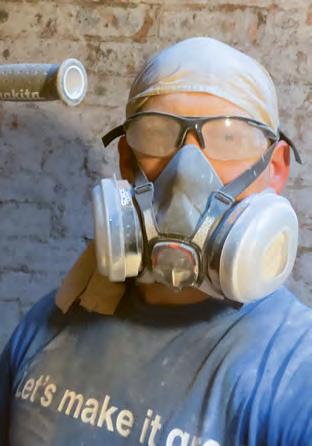
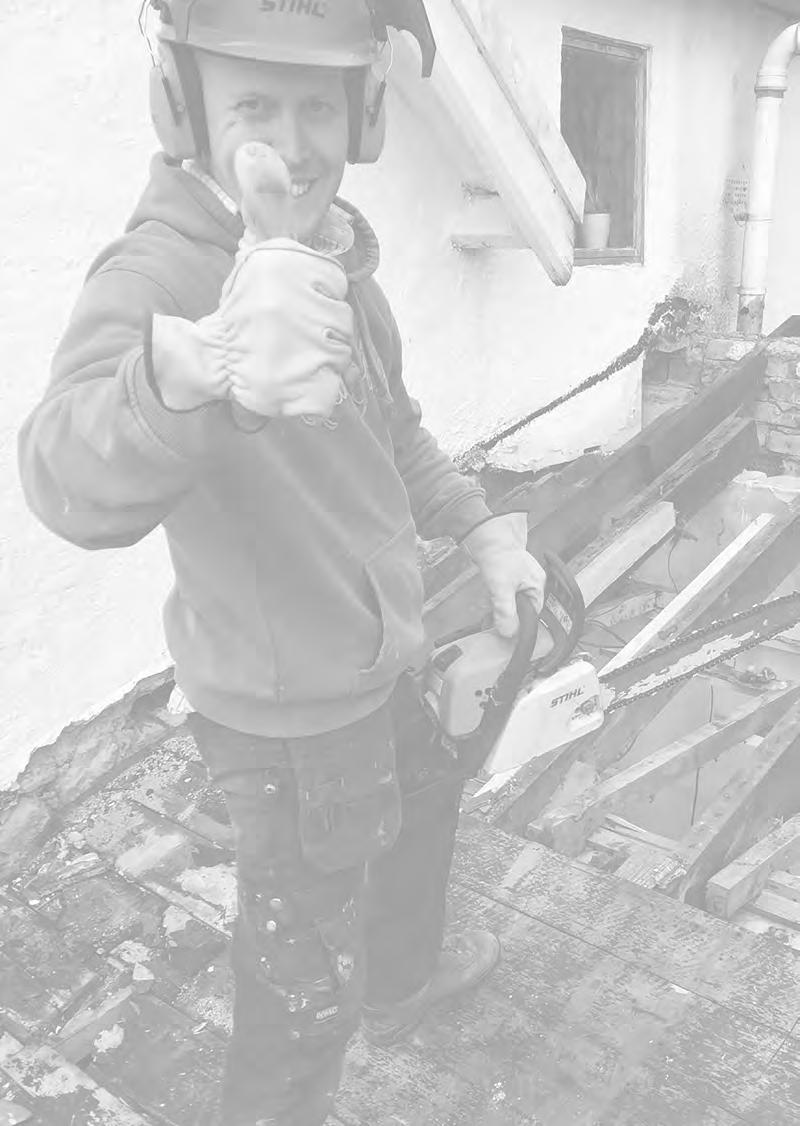
retirees, but there are a handful of under 50’s as well. And he seems to be doing his own recruitment to change that.
After a 5-kilometre run with local club Coastal Cadence, Rory was having a chat with other runners when the discussion turned to building stuff and various projects. It wasn’t long before Men’s Sheds were brought up, sparking interest among some group members.
One prospective Shed member is fly-in-flyout (FIFO) geologist Louis Johansson, who joined Rory for a tour around the Mosman Park Shed.
Louis says he’s always heard his dad talk about the Men’s Shed initiative but hadn’t really considered it for himself before.
“Just having other people talk about it, I was like, ‘oh yeah, I could do that,’” he says.
For Louis, the tools and facilities available are the main drawcard – but he doesn’t discount the social benefits.
“Just having people that are kind of willing to help and teach you things is also part of it as well,” he says.
“That’s positive, especially for the older guys, if they don’t have as much social interaction and it becomes their kind of little community. That’s always quite positive,” Louis says.
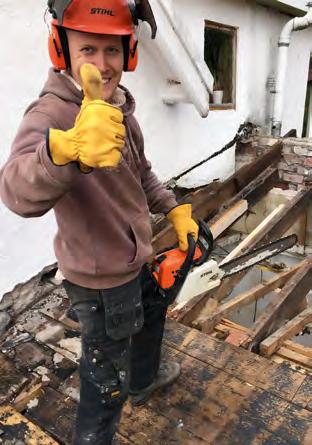
As for now, Louis is still considering joining. Doing FIFO work, he’s often available during the week, but recognises for other young men who have a nine-to-five, the weekday schedule may be a barrier. He also says coming into a predominantly older crowd can be intimidating.
“I definitely think it’s one of those things that if you have more young people in there, it’s going to attract more young people,” he says.
“But you’ve got to get some young people in there to start with.”
So, whether you’re in it for the tools, the chance to get creative and express yourself, or to meet a few new people, Rory and Louis show us all that Men’s Sheds aren’t just for retirees.
Maybe, this is the push you might need to join your local Shed, and no matter your age, rally up a friend or two. As Rory says, forming more social connections, and the act of creating is ‘incredibly good’ for your mental health.
“It’s also incredibly good for your productivity and basically leading a fulfilling life. So on that basis alone, this is something that anyone should be doing,” he says.
“Basically, to try and have a more enjoyable experience of what short time we’re here for.”

By Andrew Chounding and Samantha Goerling

A group of mostly retired farmers on Western Australia’s south coast have created a medical equipment library for their community funded by proceeds from a recycling program.
Hopetoun Men in Sheds has been running a Containers for Change program in the seaside town, 550km south-east of Perth, for about three and a half years.
Community members can exchange cans and bottles for 10 cents each, and the Men’s Shed receives a few cents a container for operating the exchange point.
And while the closure of a nickel mine in Ravensthorpe is expected to reduce the volume of containers through the collection point, it won’t be by a huge amount.
The proceeds keep the shed ticking over, and they have also donated more than $100,000 to community groups.
President Darryl Quinn said a small group of volunteers work through cans and bottles every Saturday.
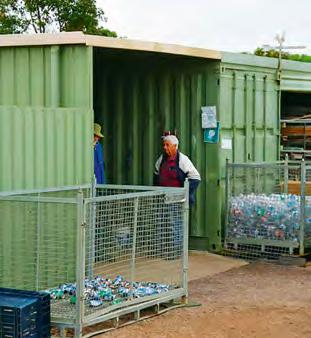
“It varies between 10,000 to our best day [which] was 22,000,” he said.
“I don’t know how many cubic meters we have saved going into the tip.”
The local pub and mine collect the containers, as do members of the public who come from as far as Munglinup, Jerramungup and Newdegate.
“There’s a guy coming in with six wool packs. He’s just finished seeding, and he’s had a troop of guys out there. We get that all the time,” Mr Quinn said.
Hopetoun, which had a population of 1,100 in the 2021 census, is a popular retirement town for the region, but residents often travel to Albany, Esperance or Ravensthorpe for healthcare.
Peter MacMahon, a Hopetoun Men’s Shed member, said he and his wife picked up a friend who had a broken ankle from Albany and brought her home.
“When we got back to Hopetoun, she asked for a commode chair and a shower chair,” MacMahon said.
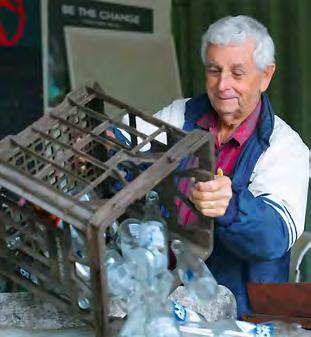
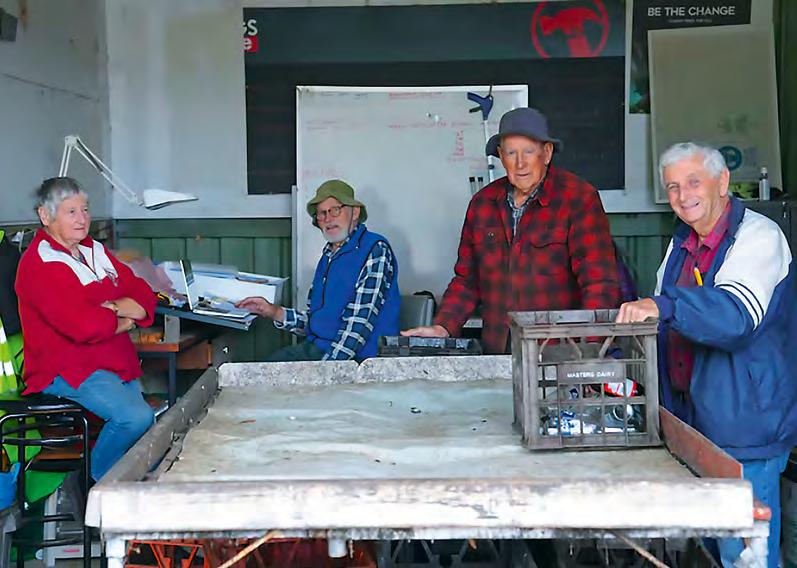
“We rang Ravensthorpe hospital and were told that we could get one from up there — another 100 kilometres travelling — if we could find the gardener with the key in his pocket.”
That was the beginning of the idea for the equipment library.
“I went to the committee of the Men’s Shed and suggested that we buy about half a dozen articles of basic equipment, which they agreed to,” Mr MacMahon said.
“We’ve got over 50 items in there now, and when people want to use it, they just come and get it, use it, bring it back when they’re finished.”
Many items have been donated, including crutches, wheelchairs, and even a CPAP (continuous positive airway pressure) machine to treat sleep apnoea, which can cost thousands of dollars.
“Things just snowballed,” Mr MacMahon said.

“Think of a good idea, and if it can help the community in any way, well, why not?
“We’re here to support the community, help the community, and it’s gone very well.”
While the Men’s Shed has had great success supporting community groups and initiatives, Mr Quinn said it had been difficult for their small group of regular volunteers.
“We’re battling, four to six people is adequate, but we really do need some more numbers,” he said.
“We’ve got a lady in here, Patty. She does a wonderful job. We’re open to anybody. You’d be welcome with open arms.”
Article and photos courtesy of ABC Great Southern
By Chloe Henville
We may be two months on from Men’s Health week, which was from June 10th to 16th, but I think this is the perfect time to revaluate the message of 2024 –prioritising and raising awareness of men’s health.
Historically, men have been shown to talk about their physical and mental health less than women – and this has a real, visible impact on health and wellbeing. According to Western Sydney University, around 40 per cent of poor health and premature death in Australian men can be prevented by healthier habits. 51 per cent of Australian men admitted they had or were currently suffering from poor mental health symptoms, according to June research from Compare the Market
When you take a look at statistics like these, it’s not contentious to say men’s health is a topic we should be talking about year-round.
So, let’s take the opportunity to spotlight an organisation that takes men’s health seriously every day of the week: South West Aboriginal Medical Service (SWAMS).
Located in Bunbury, the SWAMS mission is to build strong, healthy Aboriginal communities by providing high-quality, culturally informed and holistic healthcare.
SWAMS CEO Ms Lesley Nelson says engaging with men is a priority for their organisation.
“While many of our males are strong in culture, unfortunately Aboriginal men do often face significant health disparities, including higher rates of chronic diseases, mental health and lower life expectancy than other Australians,” she says.
Ms Nelson says part of their mission is to make health services available, both physically and financially.
“We are a fully bulk billing medical practice and provide GP medical services to Aboriginal and Torres Strait Islander
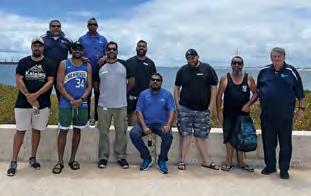
community members in greater Bunbury and surrounding communities such as Busselton, Manjimup, Narrogin and Katanning,” she says.
“This is complemented by Aboriginal health practitioners, Aboriginal health workers, Indigenous outreach workers and nurses.”
Like Men’s Sheds, SWAMS is aware of the importance of encouraging conversation about men’s health, reducing stigma, and pushing men to get regular check-ups. This is a year-round Endeavor, not just during Men’s Health week.
Among general health services, they offer a men’s group called Maamun Danjooo Koorliny Waankininy, which translates to ‘men, together walking talking’.
It’s a weekly community group which has been meeting for about 20 years, providing a safe space for Aboriginal and Torres Strait Islander men to talk about a range of topics: from mental health, and alcohol and drugs, to housing, employment and culture. It’s free to join and members are provided a healthy lunch as well.
SWAMS also has Mooditj Mia men’s groups in Harvey, Busselton and Mandurah. Mooditj Mia translates to ‘strong home’ in Noongar language.
Ms Nelson says having this opportunity for open and honest dialogue creates an environment of support that is vital for community wellbeing. The program also
offers a range of hands-on activities, to make members feel more at ease.
“We sometimes use Men’s Shed facilities, which we are most grateful to be able to do,” she says.
“We find that this ‘doing while yarning’ approach really helps our men open up.”
Ms Nelson says the SWAMS team recognise that it can be hard for men to openly discuss their problems, both with physical and mental issues, often choosing to stay silent and suffer alone.
Creating opportunities for connection is one way to break down this wall of isolation.
“The friendships that stem from the Men’s Group are so important in breaking down stigma and increasing engagement,” says Ms Nelson.
SWAMS also realises the value of employment for financial stability, daily purpose, and overall wellbeing. Furthermore, a genuine understanding of the issues faced by Aboriginal and Torres Strait Islander people is vital for responding to the health issues these communities

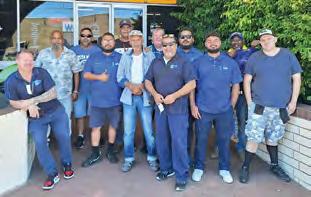
face. That’s why it’s a priority at SWAMS, says Ms Nelson.
“As an Aboriginal community-controlled organisation, our staff are trained in cultural awareness, and we are focused on increasing our upskilling and employment of Aboriginal staff,” she says.
“We are proud to be doing this important work and hope more maaman (men) join us.”
If you want to find out more about SWAMS and their services, go to www.swams.com. au or phone 9797 8111.

To
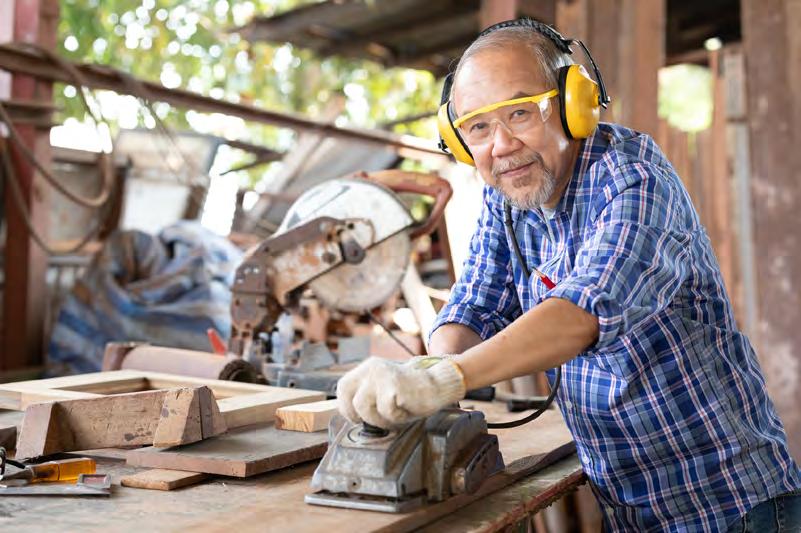
By James Wild
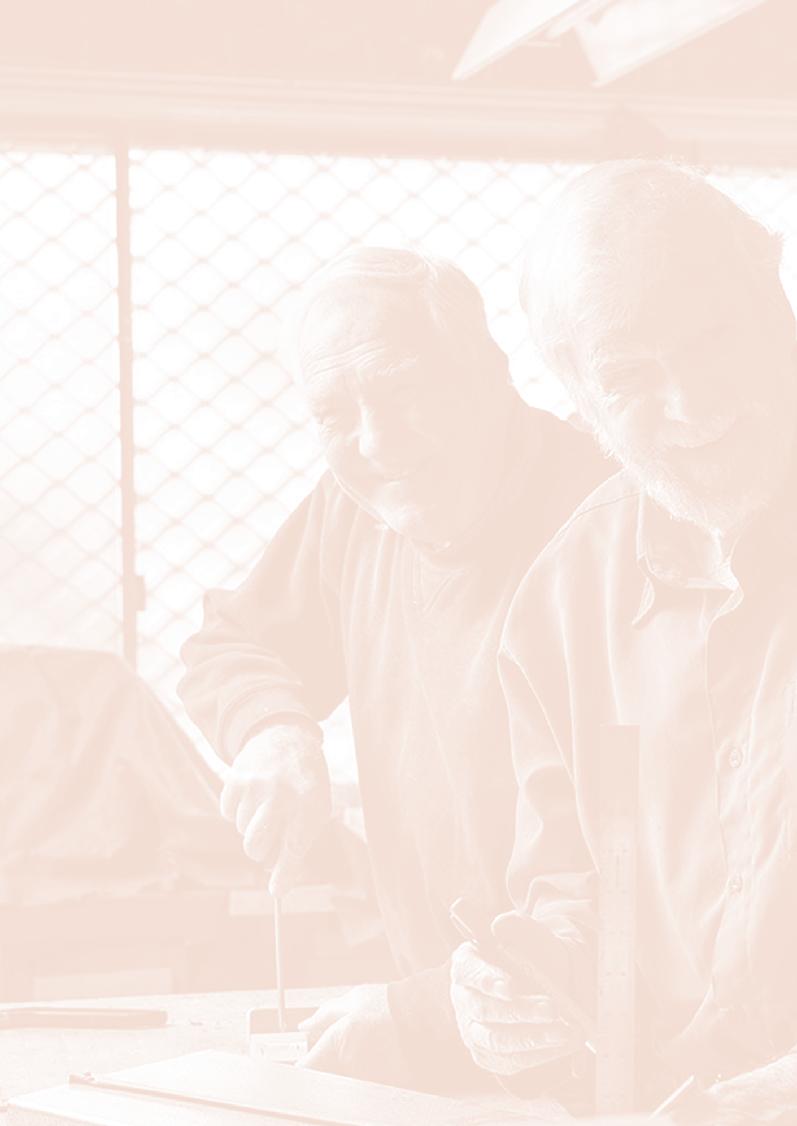
Volunteering Australia defines volunteering as ‘time willingly given for the common good and without financial gain’. In the context of a Shed, this statement covers a wide range of contributions from members. It can be the more formal commitment of joining the committee, through to being the go-to person for arranging the regular Bunnings Sausage Sizzle. What is often forgotten is that volunteering is also the more informal contributions we make on a day-to-day basis; the guy washing the cups after morning tea, and the person who takes it upon themselves to tidy and sweep the workshop floor each week.
What truly matters though is the importance of volunteering or simply put helping-out
This is not just for the common good, but it is also good for you, as an individual. Many studies have shown that volunteering clearly impacts on our ability to live longer, healthier and happier lives.
When there is a culture of helping-out in Sheds we see the benefits grow and spill out into their local communities. The recent research with Curtin University into What Makes a Thriving Shed showed Strong Partnerships are key to every Shed’s success. Partnerships with other community groups, schools, other Sheds, community members and local governments is often underpinned by the Shed’s ability to roll up their collective sleeves and help-out when needed. We have seen some magnificent
Volunteering helps with:
Improved Mood and Reduced Depression: Volunteering has been associated with decreased symptoms of depression and improved overall mood.
Enhanced Life Satisfaction: People who volunteer are likely to experience increased life satisfaction and overall wellbeing.
Increased Social Connections: Volunteering fosters social connections, which can combat loneliness and social isolation.
Enhanced Sense of Purpose: Volunteering can give individuals a sense of purpose and meaning in life, which is crucial for mental wellbeing.
Reduced Stress: Engaging in volunteer activities can act as a distraction from personal worries and reduce stress levels. The act of helping others can also trigger the release of oxytocin, a hormone that helps to lower stress.
Increased Happiness: Helping others can boost levels of happiness. The act of giving has been linked to the release of endorphins, sometimes known as the “helper’s high.”
Improved Self-Esteem: Successfully contributing to the wellbeing of others can enhance self-esteem and confidence.
Skill Development: Volunteering can help individuals develop new skills and experiences, which can be beneficial for personal growth and, of course, your own projects.
Mental Resilience: Regular volunteering can build mental resilience, making individuals better equipped to handle life’s challenges.
examples of this across the state. There are too many to name here, but some notable examples:
● Keeping the community clean and tidy – The Fremantle Community Men’s Shed Clean Team are regularly seen removing stickers and unwanted graffiti throughout the Fremantle area.
● Bringing the community together
– The Chapman Valley Shed put on an outdoor cinema each year, staffed by volunteers to bring families and the community together.
● Helping families in need – the Wanneroo Community Men’s Shed offer low-cost computer equipment for families in need. The Bassendean Community Men’s Shed are working together with first responders on a project to build a cubby house for a family whose children are experiencing significant illness.
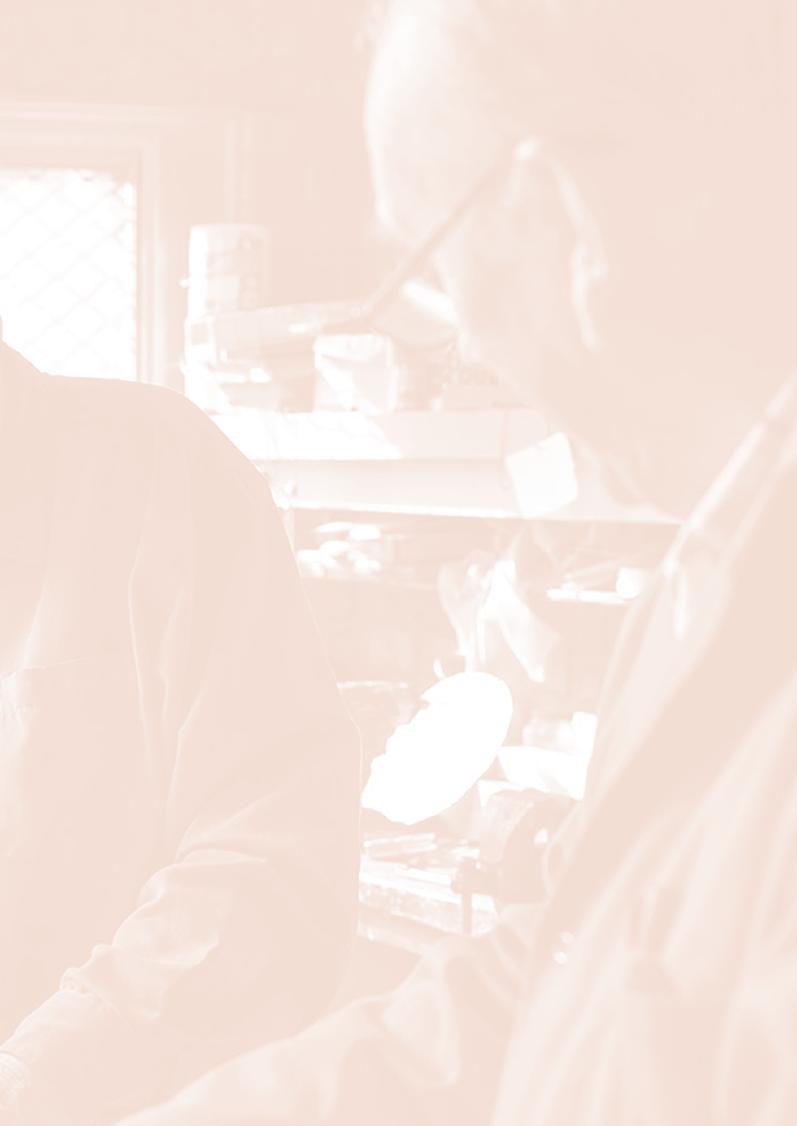
● Local environment Projects – Sheds including the Mosman Park Men’s Shed looking after local nature playgrounds.
● Helping people with disabilities –Stirling Community Men’s Shed’s ‘Men in Stitches’ program uses locally donated materials to make shopping bags as part of the Shed’s buddy program supporting men with mental or physical health issues.
● Supporting other men – Every year we see dozens of events up and down WA, reaching out to men in the community, encouraging them to connect with other people in their community; all run and managed by volunteers.
Remarkable isn’t it! The collective efforts of a few people can have such a profound positive impact on where we live and the people in our communities. If you have stories from your sheds about how you are helping-out in your communities, we’d love to hear from you and include them in future editions of Sheds WA.
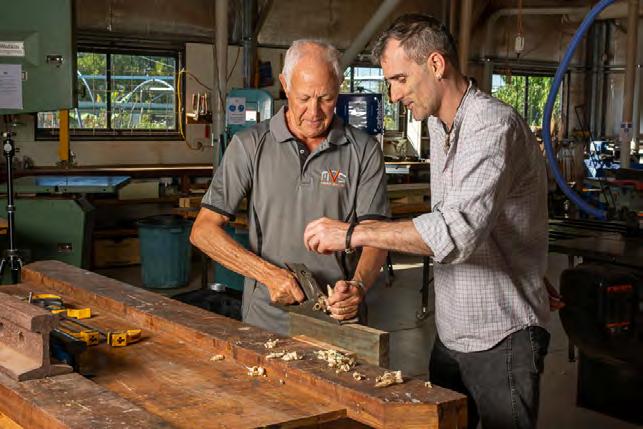
Serves as an indicator of wellbeing and social cohesion. It also has links to the economic and health status of a nation. By volunteering, people can become more outwardly focused, which may strengthen social interactions or even reduce anxiety (Department of Health 2019).
Nestled in the heart of Perth, MAN Health Clinic is the go-to destination for men seeking a thorough, male-focussed approach to their health.
After six successful months of operation, MAN Health Clinic has already made a significant impact on the lives of many men, offering tailored assessment, investigations and treatment designed to promote overall well-being and longevity.
Passionate about men’s preventative healthcare, UK-trained GP Dr. Lloyd Evans launched MAN Health Clinic with a view to offering a first-of-its-kind clinic in Western Australia. The clinic is dedicated to addressing the unique health needs of men throughout all stages of life by offering a ‘wholeman’ approach to health.
At MAN Health Clinic, the primary focus is on helping men optimise their health for longevity and overall wellbeing. The clinic offers men a relaxed and trusting environment and encourages a proactive approach to health.
“Men have unique needs. We invest heavily in our families, our homes, and our careers but neglect the one thing that facilitates all that- our health. We even invest in an annual service for our trucks, yet many of us fail to consider that we ourselves may benefit from a similar plan. MAN Health Clinic is perfectly placed to offer this to men of all ages!”
“Whether a new father, a man looking to explore his risk of disease, a man struggling with being overweight, or a man wanting to optimise his overall health with ageing, our whole-man approach puts men at the centre of what we do.”
MAN Health Clinic is different to your regular General Practitioner service. Following an initial assessment, the clinic spends a lot more time going into detail regarding your health concerns and also creates a written report and annual plan tailored specifically to you.
All packages offered consist of an initial one-hour, in-person consultation. Subsequent follow-up appointments are then conducted offering tailored, flexible and extensive contact time to suit. MAN Health Clinic consultations can be accessed via www.manhealth.com.au
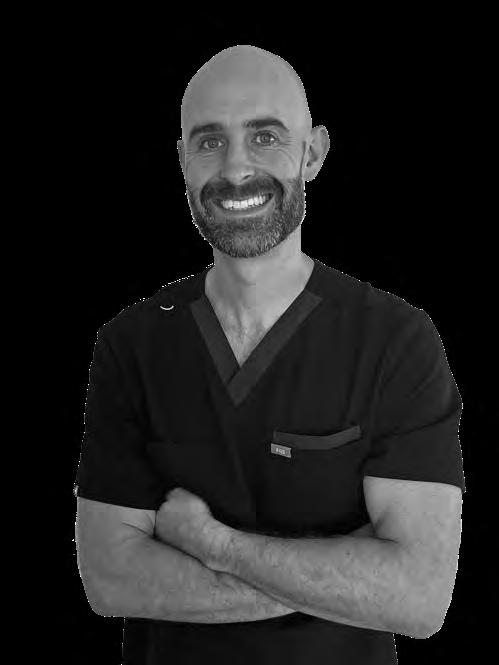
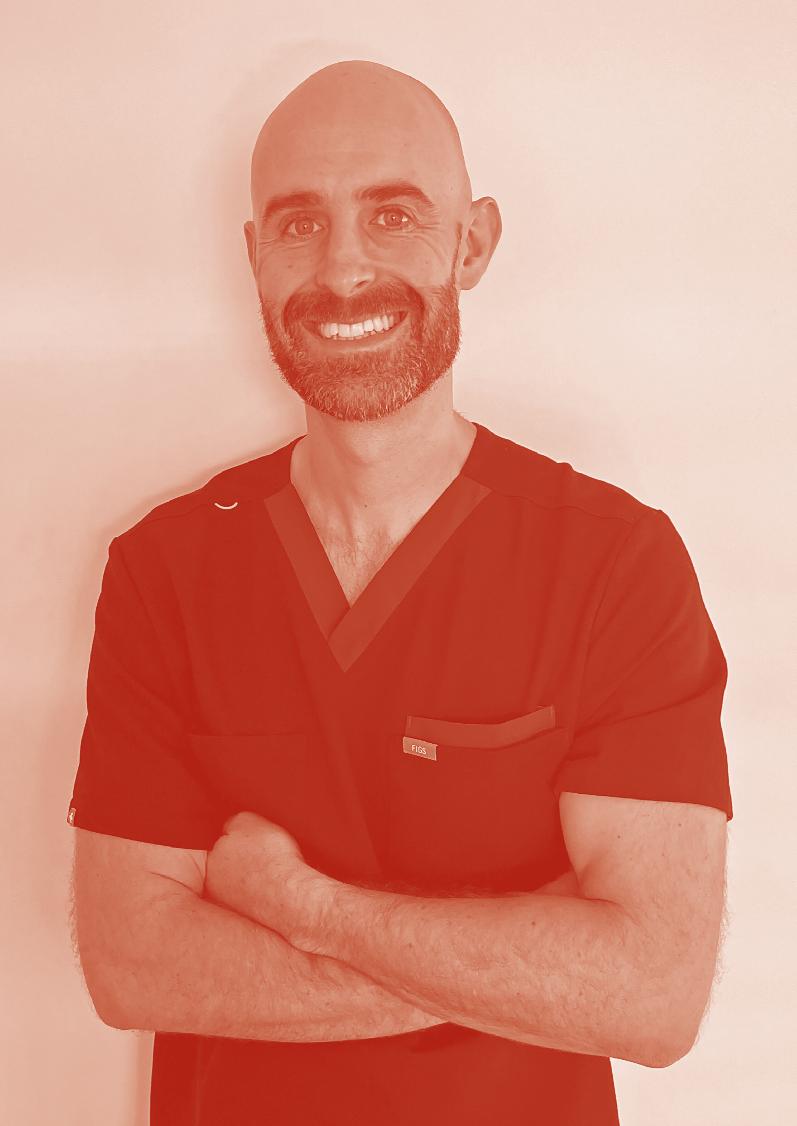
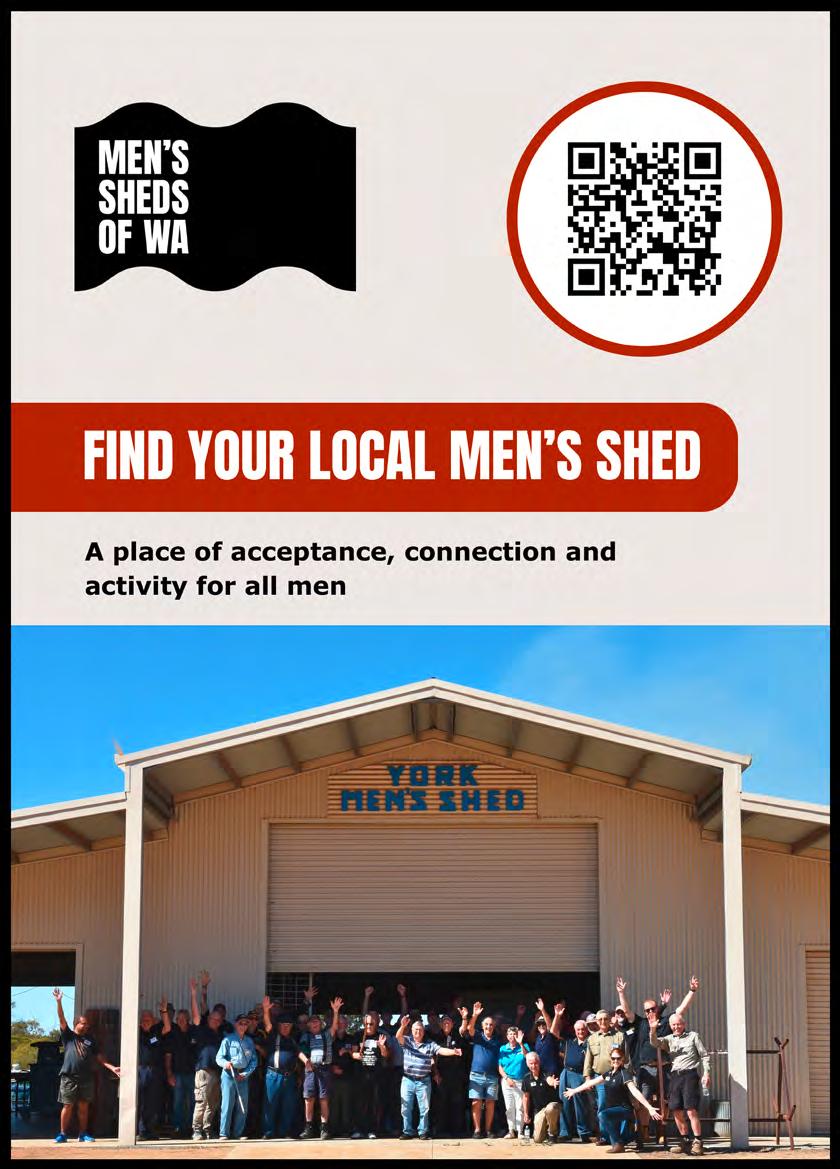
Juniper.org.au | 1300 313 000 homecare@juniper.org.au
Juniper.org.au | 1300 313 000 homecare@juniper.org.au
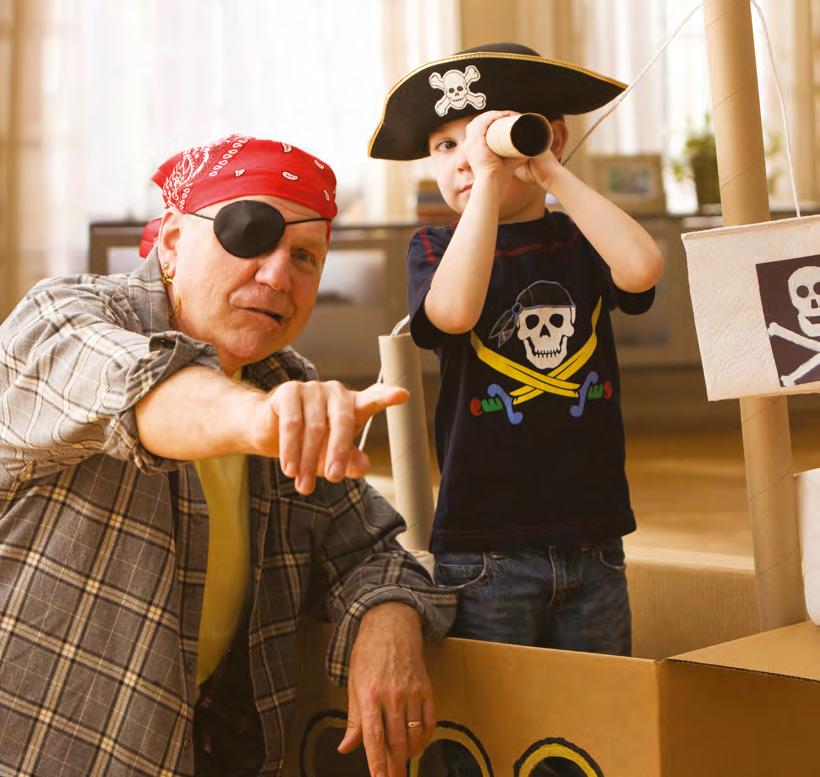
“Juniper